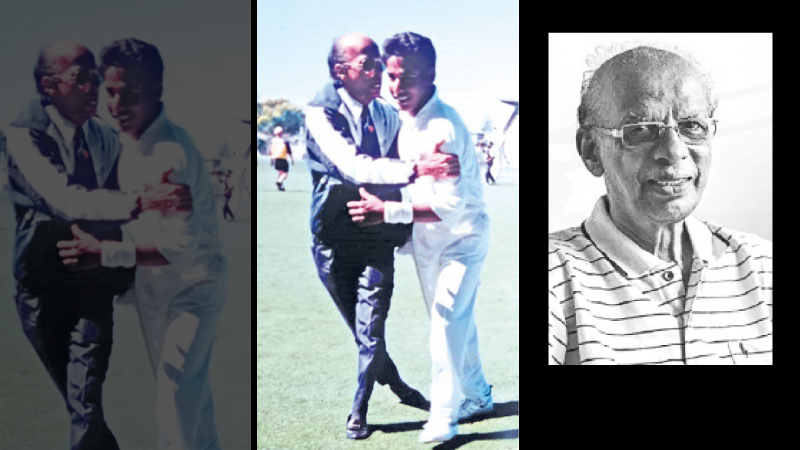On a day perfect for cricket March 15, 1995, the affable figure of Neil Perera sat on the edge of his seat in sunny Napier, New Zealand as he watched as team manager Sri Lanka inch closer to what was to become the country’s first ever Test victory overseas.
Minutes later a young and promising fast bowler Chaminda Vaas grabbed the wicket of last man Kerry Walmsley, a strapping giant, and Neil jumped out of his seat, raced onto the ground and hugged the boyish Vaas whose ten wickets in the match was worth its weight in gold.
Neil savoured the cricketing gift of his life and the players that included the likes of Arjuna Ranatunga the captain, Aravinda de Silva and Asanka Gurusinha had their reasons to dedicate the win to anything or anyone near and dear to them.
Neil’s death this week at the age of 95 did not come as any shock for a man who can face his Creator with a bag of virtues unlike some of the present day cricket administrators who have become filthy rich with ill-gotten wealth thanks to cricket.
Neil was the secretary of the Cricket Board from 1972 to 75 and again from 1992 to’95 when cricket in Sri Lanka was devoid of corruption, nepotism and politics unlike today when its governance has more to do with what happens behind closed doors by some people who are not worth their salt.
Neil was the kind of unassuming administrator who knew cricket inside out, its technicalities and how it should be presented to followers. To the Press and journalists his conduct made him a cut above the rest. On some occasions he would be the first in the Press Box when cricket was played by gentlemen and governed by gentlemen.
He was cool headed, calm and ready to answer the telephone at a time there was no media unit at the Board of Control for Cricket in Sri Lanka to issue sunshine releases of statements. Numerous were the healthy debates he had with journalists and Neil never held anything personal unlike the present day administrator who tries every stunt and tactic to silence independent media personnel.
He never even tried to muzzle journalists like the present day schemers who stoop down in their unsuccessful attempts to subdue the remaining hardcore journalists in the newspapers.
He loved to read newspapers and was a better reader of public opinion always in touch with ground realities.
He helped nurture and identify many cricketers outside Colombo especially the poor kids in and around Panadura, one of whom was the 1996 World Cup champion bowler Ravindra Pushpakumara who was also in the team that won in Napier.
On one occasion, Neil brooked no nonsense from a senior player in the Sri Lanka team who went up to him with a complaint that Pushpakumra was receiving undue prominence in the newspapers which could discourage other fast bowlers at the time.
Like a father figure Neil told the senior player: “I cannot control the Press and that is their job”, and the matter was settled.
Neil had nothing on a platter and never wanted anything on a platter. Licking behind politicians or playing dirty internal politics was not his forte and that was the hall mark of a man who only wanted to make cricket a winner.









